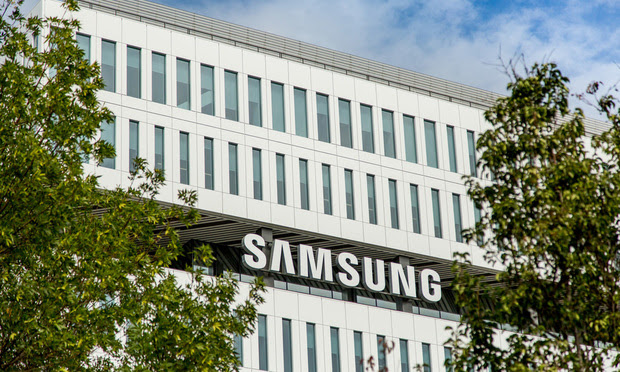Skilled in the Art: Samsung Might Win Patent War But Lose Fee Fight + Apple Scores Early Points at PTAB Against Qualcomm
What should happen if you lied and stonewalled your way through litigation, got hit with an exceptional case sanction and then got two of three patents invalidated at PTAB? Samsung will soon find out.
January 15, 2019 at 09:00 PM
7 minute read
Welcome to Skilled in the Art. I'm Law.com IP reporter Scott Graham. It's been nearly five years since the Supreme Court set a new standard for fee-shifting in “exceptional” patent cases. Octane Fitness instructs district judges to consider the totality of the circumstances when deciding exceptionality. A case before the Federal Circuit last week poses the question, what if an infringer wins most of its case at the PTAB, but the fee award was designed in part to punish litigation misconduct at trial? From the arguments—which I'll describe below—it sounds like a close question. As always you can email me your thoughts and feedback and follow me on Twitter.
Victorious Samsung Might Still Get Hit With Fees
So what do you think should happen if a defendant lied and stonewalled its way through most of a patent infringement trial, and got hit with a $7 million exceptional case sanction—but two of the three patents were ultimately proven invalid at the PTAB?
We may soon get an answer from the Federal Circuit in Imperium IP Holdings v. Samsung Electronics Co., which was argued to the court last Tuesday. Samsung was ordered to pay $7 million—on top of a $21 million willful infringement award—after U.S. District Judge Amos Mazzant III found Samsung withheld material documents and gave false testimony during trial.
Last week a Federal Circuit panel signaled it would affirm PTAB findings of invalidity on Imperium's 6,836,290 and 7,092,029 digital imaging patents (and, in fact, the court summarily affirmed them the next day). But the remaining 6,271,884 patent on image flicker reduction sounded like a closer call, and no decision has been issued yet.
Either way, “the fee award is going to have to be vacated,” Ropes & Gray partner Doug Hallward-Driemeier told the court. “If Samsung prevails on any of the issues and vacates the final judgment, there will have to be a remand also of the fee award.”
Judge Kathleen O'Malley didn't sound so sure. “Did you suddenly produce documents timely because one of the patents was invalid?” she asked at one point.
Mazzant made a series of harsh findings against Samsung in awarding fees. In addition to having willfully infringed the patents, Samsung executives falsely testified they weren't interested in Imperium's patents and hadn't paid attention to them for years. But documents produced after trial was under way showed that Samsung had tried to obtain the patents through a broker without revealing Samsung's identity.
Those documents should not have been hard for Samsung to find, Mazzant wrote: They were located on one of the executives' laptops, in a folder labeled “Imperium.” Finally, Samsung continued to infringe the '884 and '029 patents, Mazzant wrote, “after the jury found infringement, after the court entered judgment, after the court enhanced damages.”
On Tuesday, Hallward-Driemeier argued that some of Mazzant's findings were “demonstrably untrue,” and that between discovery sanctions imposed at trial and the fee award, Samsung had effectively been penalized some $20 million. At a minimum Samsung will be entitled to reconsideration if two of the three patents aren't valid, he argued.
But O'Malley continually pushed back. “From an objective perspective, it shouldn't just be the cost of doing business for you to copy someone else's patent, and then hope that later down the road you can go through an IPR or something and find it to be invalid,” she said. “And so maybe a $20 million sanction is exactly what businesses like this need.”
Judge Timothy Dyk was siding more with Samsung. “You agree you'd have to be a prevailing party” to win fees, he asked Imperium counsel Bill Sigler of Fisch Sigler. “And if we were to hold that either the '029 was invalid or the '884 was invalid … that would require reassessment of that question?”
Sigler conceded that if all three patents were knocked out, the fee award might go away. But if the '884 stands, Imperium would still be the prevailing party, entitled to $4.8 million in damages, trebled for willfulness, plus the exceptional case fees. “The law doesn't require the district court to consider the strength or reasonableness of every Samsung defense,” Sigler said. “The court was well within its discretion here to award fees under either the willfulness judgment or Samsung's litigation misconduct.”
Judge Richard Taranto sounded as if he may hold the tiebreaking vote. Has the Federal Circuit decided a case since Octane Fitness that says a district judge must consider the strength of the parties' litigation positions, he asked Sigler.
“I'm aware of no case,” Sigler said.
Kilpatrick Opens in Beijing
AmLaw 100 firms continue to build out their IP capability in China. The latest entry is Kilpatrick Townsend & Stockton, which has opened a Beijing office to serve clients' trademark needs.
“We felt we needed to be on the ground in China,” Chris Woods, the head of Kilpatrick's China brands team, told my ALM colleague Meredith Hobbs. Woods is relocating from New York to open the Beijing location, along with Shuang Yu, an associate, and Qunfan Chen, a trademark agent.
Kilpatrick has been in Shanghai since 2012, but that office is more broadly focused on intellectual property law, including patent protection. China's major government agencies, including its trademark registration agency and intellectual property court, are in Beijing, noted Kilpatrick's chair, Henry Walker IV.
Quinn Patent Partner Is Taken Too Soon
One of the founders of Quinn Emanuel Urquhart & Sullivan's patent practice, Steven Anderson, has died after a years-long struggle with lung cancer, the firm said. He was 55.
A statement posted on Quinn Emanuel's website Monday said Anderson, based in Los Angeles, passed away on Dec. 27.
Anderson joined Quinn Emanuel in 1994, when the firm numbered only about 30 lawyers. Today it's one of the leading national patent practices, representing clients such as Google, Samsung and Qualcomm.
Los Angeles partner Michael Williams told my ALM colleague Scott Flaherty that Anderson knew how to litigate fiercely while maintaining a respectful and professional relationship with his opponents.
Since being diagnosed some 15 years ago, Anderson had served as a resource for others battling the disease, including Williams' mother. He was a “very caring, mentoring type of individual,” Williams said.
PTAB Launches IPR of Key Qualcomm Patent
Even as the Federal Trade Commission's antitrust case against Qualcomm rolls along before U.S. District Judge Lucy Koh, the communications giant and Applecontinue trading punches around the globe.
Qualcomm notched wins in China and Munich just before trial, but this week another German court dismissed Qualcomm's latest suit against Apple, according to the Wall Street Journal.
Qualcomm GC Donald Rosenberg told the Journal that the Mannheim Regional Court had interpreted its patent very narrowly. “We strongly disagree and will appeal,” he said.
“We regret Qualcomm's use of the court to divert attention from their illegal behavior that is the subject of multiple lawsuits and proceedings around the world,” Apple said in a written statement.
Meanwhile, the Patent Trial and Appeal Board instituted proceedings today in 10 Apple IPRs targeting dozens of claims in three Qualcomm patents. Notably, they include claim 31 of Qualcomm's 9,535,490 patent on battery conservation—the claim that undergirds a pending International Trade Commission review.
If the PTAB were ultimately to invalidate that patent, it would remove one of the most dangerous arrows in Qualcomm's quiver.
That's all from Skilled in the Art this week. I'll see you all again on Friday.
This content has been archived. It is available through our partners, LexisNexis® and Bloomberg Law.
To view this content, please continue to their sites.
Not a Lexis Subscriber?
Subscribe Now
Not a Bloomberg Law Subscriber?
Subscribe Now
NOT FOR REPRINT
© 2025 ALM Global, LLC, All Rights Reserved. Request academic re-use from www.copyright.com. All other uses, submit a request to [email protected]. For more information visit Asset & Logo Licensing.
You Might Like
View All
Skilled in the Art With Scott Graham: I'm So Glad We Had This Time Together

Design Patent Appeal Splinters Federal Circuit Panel + Susman Scores $163M Jury Verdict + Finnegan Protects Under Armour's House
Trending Stories
Who Got The Work
J. Brugh Lower of Gibbons has entered an appearance for industrial equipment supplier Devco Corporation in a pending trademark infringement lawsuit. The suit, accusing the defendant of selling knock-off Graco products, was filed Dec. 18 in New Jersey District Court by Rivkin Radler on behalf of Graco Inc. and Graco Minnesota. The case, assigned to U.S. District Judge Zahid N. Quraishi, is 3:24-cv-11294, Graco Inc. et al v. Devco Corporation.
Who Got The Work
Rebecca Maller-Stein and Kent A. Yalowitz of Arnold & Porter Kaye Scholer have entered their appearances for Hanaco Venture Capital and its executives, Lior Prosor and David Frankel, in a pending securities lawsuit. The action, filed on Dec. 24 in New York Southern District Court by Zell, Aron & Co. on behalf of Goldeneye Advisors, accuses the defendants of negligently and fraudulently managing the plaintiff's $1 million investment. The case, assigned to U.S. District Judge Vernon S. Broderick, is 1:24-cv-09918, Goldeneye Advisors, LLC v. Hanaco Venture Capital, Ltd. et al.
Who Got The Work
Attorneys from A&O Shearman has stepped in as defense counsel for Toronto-Dominion Bank and other defendants in a pending securities class action. The suit, filed Dec. 11 in New York Southern District Court by Bleichmar Fonti & Auld, accuses the defendants of concealing the bank's 'pervasive' deficiencies in regards to its compliance with the Bank Secrecy Act and the quality of its anti-money laundering controls. The case, assigned to U.S. District Judge Arun Subramanian, is 1:24-cv-09445, Gonzalez v. The Toronto-Dominion Bank et al.
Who Got The Work
Crown Castle International, a Pennsylvania company providing shared communications infrastructure, has turned to Luke D. Wolf of Gordon Rees Scully Mansukhani to fend off a pending breach-of-contract lawsuit. The court action, filed Nov. 25 in Michigan Eastern District Court by Hooper Hathaway PC on behalf of The Town Residences LLC, accuses Crown Castle of failing to transfer approximately $30,000 in utility payments from T-Mobile in breach of a roof-top lease and assignment agreement. The case, assigned to U.S. District Judge Susan K. Declercq, is 2:24-cv-13131, The Town Residences LLC v. T-Mobile US, Inc. et al.
Who Got The Work
Wilfred P. Coronato and Daniel M. Schwartz of McCarter & English have stepped in as defense counsel to Electrolux Home Products Inc. in a pending product liability lawsuit. The court action, filed Nov. 26 in New York Eastern District Court by Poulos Lopiccolo PC and Nagel Rice LLP on behalf of David Stern, alleges that the defendant's refrigerators’ drawers and shelving repeatedly break and fall apart within months after purchase. The case, assigned to U.S. District Judge Joan M. Azrack, is 2:24-cv-08204, Stern v. Electrolux Home Products, Inc.
Featured Firms
Law Offices of Gary Martin Hays & Associates, P.C.
(470) 294-1674
Law Offices of Mark E. Salomone
(857) 444-6468
Smith & Hassler
(713) 739-1250












